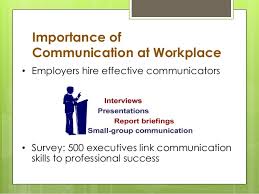 In today’s world of ever-evolving technology influencing the way we interact, one fact remains: Effective in-person communication skills are key to personal and professional success. Proactively developing these “soft” skills can help you achieve better results, become more efficient and reach goals faster.
In today’s world of ever-evolving technology influencing the way we interact, one fact remains: Effective in-person communication skills are key to personal and professional success. Proactively developing these “soft” skills can help you achieve better results, become more efficient and reach goals faster.
Here are seven of the most important communication skills to have in your toolbox:
- Listening: The ability to actively listen to and incorporate other views in your communication. Listening shows you value opinions outside of your own and are open to new concepts. An active listener will allow for pauses, repeat other people’s words and ask questions to affirm engagement in a conversation.
- Reading Nonverbal Cues: Accurately interpreting and proactively incorporate body language in communication. Body language and nonverbal messages account for 55% of all communication, so all good communicators should be able to both read and use correct nonverbal cues. When reading body language, look for positive or negative cues and apply context based on what else is being communicated.
- Confidence: Self-assuredness when communicating to build trust with an audience. For others to have confidence in what you’re communicating, you’ll need to show confidence in yourself. One way to achieve this is through research—with adequate knowledge of a subject, you’ll appear more confident when communicating.
- Interpersonal communication: Building trust and relationships with key stakeholders. Interpersonal communication skills foster strong personal relationships with peers and potential mentors. Finding common ground, displaying empathy, and building bonds will help you connect with others on an interpersonal level.
- Writing skills: Using written communication and data to support your ideas and action items. Written communication should be clear, brief and informative. To capture your audience’s attention, avoid long-winded explanations or emails with excess information.
- Verbal skills: The ability to successfully communicate ideas, thoughts and opinions verbally. Verbal skill is a soft skill that may not come naturally, but can be developed through practice. Effective verbal communication uses the correct language and tone to speak in a way that resonates with an audience.
- Teamwork skills: Effectively communicating with others who may have different ideas and skill sets. Everyone must learn to rely on others to accomplish projects and goals. This often means the ability to put aside personal differences to work toward common goals and recognize teamwork is worth more than individual contribution.
As with all skills, these communication skills can be improved with time and practice. Mastering these seven effective communication skills will be extremely beneficial for personal and professional growth.
Your Comments: Do you have all seven of these communication skills? Which ones are easy for you and which ones are more difficult to master?
Like this article? then help me share on social media. Use the buttons below
New to my site? then start here – Soft Skills – How to Succeed like an Executive
Best wishes to your career success – work smart – live more!
Lei